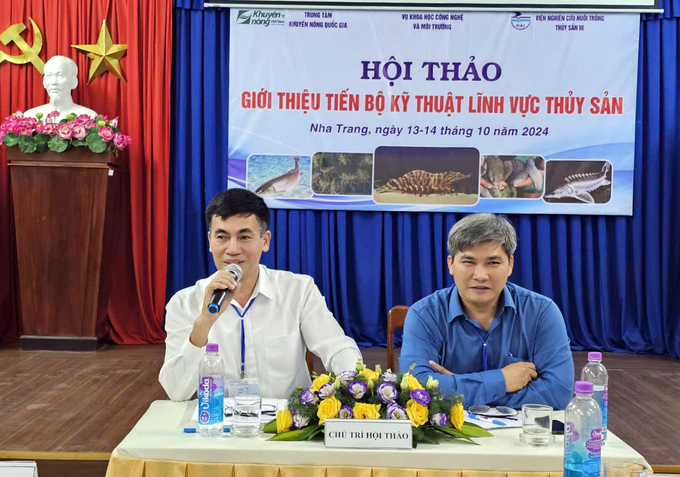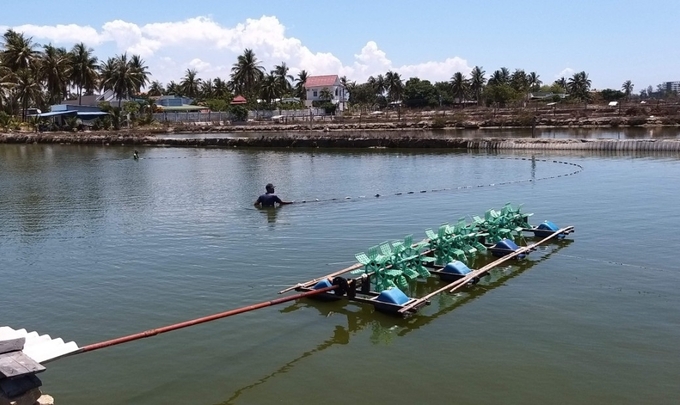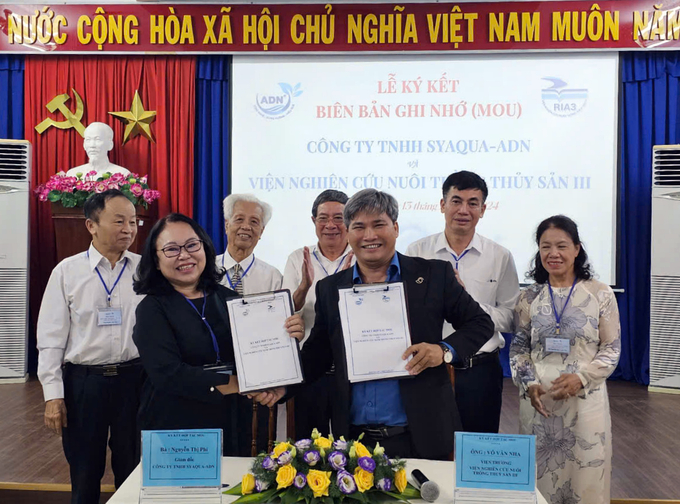May 29, 2025 | 15:47 GMT +7
May 29, 2025 | 15:47 GMT +7
Hotline: 0913.378.918
May 29, 2025 | 15:47 GMT +7
Hotline: 0913.378.918

Leaders of the National Agricultural Extension Center and the Research Institute for Aquaculture III chaired the workshop. Photo: KS.
The National Agricultural Extension Center collaborated with the Department of Science, Technology and Environment and the Research Institute for Aquaculture III (under the Ministry of Agriculture and Rural Development) to organize a workshop on the afternoon of October 13 in Nha Trang City (Khanh Hoa Province). The event aimed to introduce various technical advancements in the fisheries sector.
Hoang Van Hong, Deputy Director of the National Agricultural Extension Center, reported that in recent years, Vietnam's seafood exports have consistently ranked in the top three globally, behind China and Norway. The application of technical advancements has played a crucial role in this success. Accordingly, they enable the fisheries sector to continually develop by improving productivity and quality, reducing production costs, environmental pollution, and enhancing climate change resilience.
Notably, Vietnam's seafood export turnover reached 8.97 billion USD in 2023. During the first nine months of 2024, seafood exports amounted to 7.16 billion USD, marking an increase of 8.5% compared to the corresponding period in 2023. Additionally, the Ministry of Agriculture and Rural Development expects the fisheries sector to reach a target export value of 10 USD billion by the end of 2024.
However, Deputy Director Hoang Van Hong emphasized that in addition to implementing coordinated solutions, the application of technical advancements in production through agricultural extension activities is essential to achieving set targets.

Hoang Van Hong, Deputy Director of the National Agricultural Extension Center, presenting at the workshop. Photo: KS.
After Typhoon No. 3, provinces in Northern Vietnam have further affirmed the importance of scientific and technical advancements when inadequately designed traditional wooden cages, plastic foam buoys, and ponds suffered devastating damages. However, HDPE fish cages, installed according to expert designs and guidance, demonstrated outstanding effectiveness, resulting in minimal damage.
According to the National Agricultural Extension Center, 68 central agricultural extension projects were implemented nationwide in the fisheries sector in the years between 2019 and 2024, with 63 technical advancements transferred into production.
The application of technical advancements has increased productivity, yield, and quality in agricultural production. Additionally, they help protect the environment and improve economic efficiency by 10 to 30%. It has also transformed agricultural production habits and practices, thereby contributing to the development of a smart, modern, sustainable agriculture that promotes climate resilience and international integration.
According to Dr. Nguyen Thanh Nhon, Head of the Department of Science, International Cooperation, and Training (Research Institute for Aquaculture III), the Institute implemented 15 technical advancements in the fisheries sector in the years between 2014 and 2024. These include three advancements in seed production, eight in commercial farming technology, and four in fish disease management.
Notable examples include the procedure for nursing lobster seed in cages; seed production techniques for Russian sturgeon (Acipenser gueldenstaedtii) and Siberian sturgeon (A. baerii); production and farming of polychaete worms (Perinereis nuntia var. brevicirris); and commercial farming techniques for peanut worms (Sipunculus nudus) in earthen ponds.
Other achievements include commercial farming procedures for whiteleg shrimp (Litopenaeus vannamei) on sandy beaches in Central Vietnam, with a focus on food safety and disease control; commercial farming of barramundi (Lates calcarifer) in cages with industrial feed; and barramundi farming in ponds with industrial feed.
Additional procedures include commercial farming of sandfish (Holothura scabra) in ponds; farming of Russian sturgeon and Siberian sturgeon in tanks, and the farming of these sturgeon species in cages. The Institute also developed procedures for farming rainbow trout (Oncorhynchus mykiss) in tanks and effective solutions for treating milk disease and red body disease in caged lobsters.
The Institute also introduced procedures for controlling Vibrio spp., which causes acute hepatopancreatic necrosis disease (AHPND) in whiteleg shrimp (Litopenaeus vannamei), and procedures to manage Vibrio alginolyticus, which causes for red body disease in caged lobsters (Panulirus spp.), as well as Rickettsia-like bacteria (RLB), which causes milk disease in caged lobsters.

Over the years, the Research Institute for Aquaculture III has transferred numerous technical advancements to farmers with the aim of improving production efficiency. Photo: KS.
According to Dr. Nguyen Thanh Nhon, the fisheries sector have implemented various recognized technical advancements on a large scale, addressing pressing issues in aquaculture such as diseases in lobsters and brackish water shrimp. Furthermore, stakeholders have adopted commercial farming technologies for marine and cold-water fish to address environmental concerns in aquaculture. However, the current number of recognized advancements fail to match the volume of research and procedures developed by the Institute.
Nguyen Van Ha, CEO of Ngoc Thuy Service Production Trading Co., Ltd., located in Vinh Phuoc Ward, Nha Trang City, which specializes in the production of marine fish breeds, stated that the application of technical advancements is crucial in aquaculture. The Research Institute for Aquaculture III has developed various technical advancements such as rotifer farming, algae cultivation, and the large-scale production of pearl grouper. Subsequently, the Institute has successfully adopted these advancements to meet the demands of farmers both within and outside the province.
"The technological processes developed by the Research Institute for Aquaculture III have helped our company produce seed in an efficient manner, improve survival rates, and produce high-quality fish breeds, thereby meeting the needs of farmers," CEO Ha affirmed.

The Research Institute for Aquaculture III signed a memorandum of understanding on scientific and technological research cooperation with several businesses. Photo: KS.
According to Associate Professor Dr. Vo Van Nha, Director of the Research Institute for Aquaculture III, with the aim of promoting the efficiency of technical advancements in production, scientists must translate scientific language into terms that are accessible to farmers. In addition, researchers need to focus on assessing and understanding the needs of businesses and farmers to provide hands-on guidance for successful technology transfer. The Institute places significant emphasis on this process to integrate technical advancements into production, thereby helping businesses and farmers improve their efficiency.
At the workshop, the Research Institute for Aquaculture III signed a memorandum of understanding on scientific and technological research cooperation with five companies, including Ngoc Thuy Service and Production Trading Co., Ltd.; SYAQUA-AND Co., Ltd.; Viet Agroforestry One Member Limited Liability Company; Hai Duong Seafood Co., Ltd.; and Vina Biotech Seafood Joint Stock Company.
Translated by Nguyen Hai Long

(VAN) FAO’s Director-General addresses the 5th Baghdad International Water Conference.
/2025/05/26/1716-4-nongnghiep-191706.jpg)
(VAN) Chain linkages, technological innovation, and raw material zoning are three strategic pillars for the coconut industry to strongly develop and elevate its position on the global agricultural map.
![Advanced mariculture – an inevitable trend: [4] Accompanied by scientists](https://t.ex-cdn.com/nongnghiepmoitruong.vn/608w/files/sohk/2025/05/13/1941-pgsts-vo-van-nha-140958_717.jpg)
(VAN) According to Assoc. Prof. Dr. Vo Van Nha, Director of the RIA III, the development of advanced offshore mariculture is no longer an option but an essential path for Vietnam’s fisheries sector.

(VAN) Vietnam is intensifying the development of mollusk farming areas that meet international standards, aiming for sustainable growth and enhancing its export position in the global seafood market.
![Advanced mariculture – an inevitable trend: [3] Policy-driven momentum](https://t.ex-cdn.com/nongnghiepmoitruong.vn/608w/files/doanhtq/2025/05/21/0104-0616-0348-nuoi-bien-170339_789.jpg)
(VAN) To ensure the success of offshore mariculture that uses advanced technologies, it is essential to establish supportive policies that inspire both individuals and enterprises to invest with confidence.
![Advanced mariculture – an inevitable trend: [2] Outstanding results](https://t.ex-cdn.com/nongnghiepmoitruong.vn/608w/files/sohk/2025/05/12/4632-4136-nuoi-bien-11-164117_819.jpg)
(VAN) Pilot models of high-tech offshore mariculture in Vietnam, particularly in the South Central Coast region, have demonstrated exceptional economic returns and sustainability, setting a new direction for the country’s aquaculture industry.
![Advanced mariculture – an inevitable trend: [1] Moving offshore](https://t.ex-cdn.com/nongnghiepmoitruong.vn/608w/files/phucpm/2025/05/18/0252-2436-nuoi-bien-6-162148_783.jpg)
(VAN) Mariculture using advanced technology and moving offshore is an inevitable trend, as nearshore areas increasingly reveal limitations.